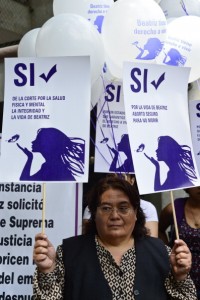
Members of Amnesty International protest in front of the El Salvador embassy in Mexico City, on May 29, 2013 (Photo Credit: Ronaldo Schemidt/AFP/Getty Images).
In collaboration with Lyric Thompson, member of Amnesty International USA’s Women’s Human Rights Coordination Group
On Wednesday, the Salvadoran Supreme Court of Justice issued a shameful decision in the case of Beatriz, the young Salvadoran mother we wrote about earlier. She is currently in a high risk pregnancy and suffers from lupus and related health problems. Her doctors have recommended an abortion to save her life, yet the Salvadoran government refuses to give her access to the medical treatment that she needs.
In response to this violation of her human rights, nearly 200,000 Amnesty activists from over 20 countries have called on the Salvadoran government to #SaveBeatriz.
As part of this campaign to save Beatriz, we were shocked by yesterday’s ruling by the Salvadoran Supreme Court that Beatriz’s doctors cannot proceed with the abortion they say is necessary to save her life. This decision compounds the suffering already caused by the lengthy and unnecessary delays that the Court created prior to issuing this ruling, taking over a month and a half after Beatriz’s lawyers first filed the request for protection (amparo) on April 11.
The Court itself recognized Beatriz is now entering a very risky stage with regards to her health. And yet, the Court’s decision will continue to subject Beatriz to cruel, inhumane and degrading treatment by denying her the medical intervention she so urgently needs while her health continues to deteriorate.
In response to this shameful decision, the Inter-American Court of Human Rights on Thursday issued medidas provisionales (protective measures) for Beatriz. The medidas provisionales are a direct order to the Salvadoran State to provide Beatriz with the treatment she needs without further delay, and as such, are binding on the government.
Although the Supreme Court’s ruling is deeply disappointing, it does not absolve Salvadoran President Mauricio Funes and the Salvadoran government from their obligations under international human rights law, which require the state to provide access to the medical treatment needed to ensure Beatriz’s health and safety.
The Salvadoran Minister of Health has stated that the government will give the medical personnel who are treating Beatriz every support to provide the medical intervention that she needs to save her life and preserve her health. This commitment must be translated into immediate action to end this violation of Beatriz’s human rights and to prevent her from suffering further.
Sadly, Beatriz is far from the only person whose sexual and reproductive rights are being violated. She is one of the 1.8 billion young people globally still unable to access the information, sexuality education, and sexual and reproductive health services they need for a safe and healthy life. Young women like Beatriz are disproportionately affected by restrictions on their sexual and reproductive rights. Complications from pregnancy are the leading cause of death among adolescent girls aged 15 to 19 in developing countries.
Everyone has the right to access quality, comprehensive, and integrated sexual and reproductive health services, as well as counseling and comprehensive sexuality education and information. Unjust and discriminatory laws like El Salvador’s total abortion ban are an impermissible denial of the rights and needs of women and girls to their bodies, their rights and ultimately, in the worst case scenario Beatriz still faces, their lives.
Beatriz cannot afford to wait any longer. Please take action on her behalf and on Twitter to #SaveBeatriz. We continue to post updates about this case on our blog as we stand in solidarity with Beatriz.